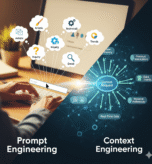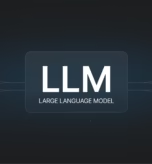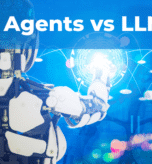Artificial Intelligence is advancing at a rapid pace. Among the most discussed innovations are Large Language Models (LLMs) and AI Agents. While the two terms are often used interchangeably, they represent very different approaches in how AI learns, thinks, and acts.
This guide breaks down LLMs vs AI Agents, their key differences, use cases, risks, and what the future holds.
1. Introduction to Modern AI Systems
In today’s digital era, AI is everywhere from virtual assistants like Siri and Alexa to advanced systems like ChatGPT. But not all AI systems are built the same.
- LLMs focus on language understanding and generation.
- AI Agents focus on decision-making and autonomous action.
Understanding this difference is crucial for businesses, developers, and end-users who want to leverage AI effectively.
2. What Are Large Language Models (LLMs)?
Large Language Models are the “brains” of modern AI. They are trained on vast datasets of text to predict and generate human-like language.
Core Capabilities of LLMs
- Writing natural, human-like responses.
- Summarizing large texts into digestible insights.
- Translating across multiple languages.
- Answering factual queries with high accuracy.
Real-World Examples of LLMs
- OpenAI’s GPT models (ChatGPT).
- Anthropic’s Claude.
- Google’s Gemini.
These models are powering millions of applications in customer service, content creation, education, and research.
Where LLMs Excel and Their Limitations
- Strengths: Text generation, knowledge recall, translation, and conversational fluency.
- Limitations: They cannot act on their own, lack real-world awareness, and can hallucinate (make up incorrect information).
3. What Are AI Agents?
AI Agents take the capabilities of LLMs and add autonomy, decision-making, and real-world interaction.
Defining Agentic AI
Agentic AI is about systems that not only generate responses but also plan, execute, and adapt tasks without constant human intervention.
How AI Agents Go Beyond LLMs
- They can use APIs to fetch real-time data.
- They can book tickets, schedule meetings, or analyze reports.
- They can improve over time by learning from feedback.
Do All AI Agents Use LLMs?
Not always. While many AI Agents are powered by LLMs for natural language understanding, some can rely on rule-based logic or hybrid systems.
Is ChatGPT an AI Agent?
ChatGPT itself is an LLM, not a full-fledged agent. However, when integrated with tools like plugins or APIs (e.g., ChatGPT with browsing and code execution), it starts functioning like an AI Agent.
4. AI Agents vs LLMs: Key Differences
| Feature | Large Language Models (LLMs) | AI Agents |
| Core Function | Generate and predict language | Execute tasks and decisions |
| Autonomy | No autonomy | Semi or fully autonomous |
| Data Access | Limited to training data | Can use tools & APIs for real-time data |
| Interaction | Conversational only | Conversational + Actionable |
| Use Cases | Content, Q&A, translation | Workflow automation, decision support |
Simply put, LLMs are the brain, AI Agents are the workers.
5. How AI Learns and Operates
Training LLMs on Massive Datasets
LLMs are trained on billions of sentences, learning grammar, logic, and knowledge patterns.
From Prediction to Action: The Gap
LLMs excel at text generation but cannot directly act. Agents fill this gap by executing solutions.
From Function Calling to Agentic Behavior
- LLMs: Predict answers.
- AI Agents: Call functions, trigger workflows, and complete tasks.
Tool Use and Environment Interaction
Agents can:
- Pull financial data from APIs.
- Operate within CRMs or ERP systems.
- Control IoT devices.
Multi-Step Reasoning in Agents
Unlike LLMs, agents can:
- Break a problem into smaller tasks.
- Plan step-by-step actions.
- Learn from mistakes (self-correction).
6. Practical Applications: AI Agents vs LLMs
Business Use Cases of LLMs
- Customer support chatbots.
- Knowledge management.
- Content creation (blogs, emails, social media posts).
Industries Leveraging AI Agents
- Healthcare: Patient monitoring, diagnostics support.
- Finance: Fraud detection, investment planning.
- E-commerce: Personalized shopping assistants.
- Sales & Marketing: Automating outreach, campaign optimization.
Case Studies of Real-World Implementations
- LLMs in Content Creation: Companies like Jasper AI use LLMs to generate SEO-friendly blogs.
- AI Agents in Workflows: Tools like AutoGPT and BabyAGI act as digital employees, handling repetitive workflows end-to-end.
7. Challenges and Risks in AI Agents vs LLMs
Bias, Errors, and Hallucinations
LLMs may provide wrong answers if the training data is flawed.
Over-Reliance on Autonomy
AI Agents, if left unchecked, could make unintended decisions—like executing wrong financial transactions.
Ethical and Security Concerns
Issues like data privacy, algorithmic bias, and accountability need strict governance.
8. The Future of AI: Towards True Autonomy
Compound AI: Combining LLMs, Experts & Agents
The most powerful systems will blend LLMs for reasoning and agents for action.
Multi-Agent Systems
Different AI agents collaborating can act like a virtual organization—one agent managing data, another running analytics, and a third creating reports.
Human + AI Partnership
Instead of replacing humans, future AI will act as a strategic partner, empowering employees to make faster, data-driven decisions.
What Are Level 3 AI Agents?
AI autonomy levels are often compared to self-driving cars:
- Level 1: Basic assistance.
- Level 2: Semi-autonomous workflows.
- Level 3: Independent task execution with minimal supervision.
9. Industry & People Behind AI Agents
Who Are the Big 4 AI Agents?
Currently, the leading AI agent platforms are:
- OpenAI’s ChatGPT with plugins.
- Google’s Gemini Agents.
- Anthropic’s Claude with agentic capabilities.
- Microsoft Copilot (integrating AI Agents into productivity tools).
Which Is the Most Powerful AI Agent?
The answer keeps evolving. As of 2025, ChatGPT with advanced plugins and integrations is one of the most versatile AI agents.
Who Are the 4 Godfathers of AI?
The pioneers often credited as the godfathers of AI are:
- Geoffrey Hinton
- Yoshua Bengio
- Yann LeCun
- Andrew Ng (sometimes included in modern lists).
10. FAQs
Are AI and LLMs the same?
No. LLMs are language generators, while agents act on outputs.
What is the difference between LLM and AI Agent vs RAG?
- LLM: Generates responses.
- AI Agent: Takes actions.
- RAG (Retrieval-Augmented Generation): Enhances LLMs with real-time search.
Do all AI Agents use LLMs?
Not all. Some are rule-based or hybrid.
Is ChatGPT an AI Agent?
By default, no. With plugins and tool use, yes.
11. Conclusion
So, which one is right for your business?
- Choose LLMs if you need text generation, summarization, or conversational AI.
- Choose AI Agents if you need decision-making, real-time data use, and workflow automation.
The future belongs to hybrid systems where LLMs provide intelligence and agents execute tasks, working together as powerful digital co-workers.
 EN
EN 





